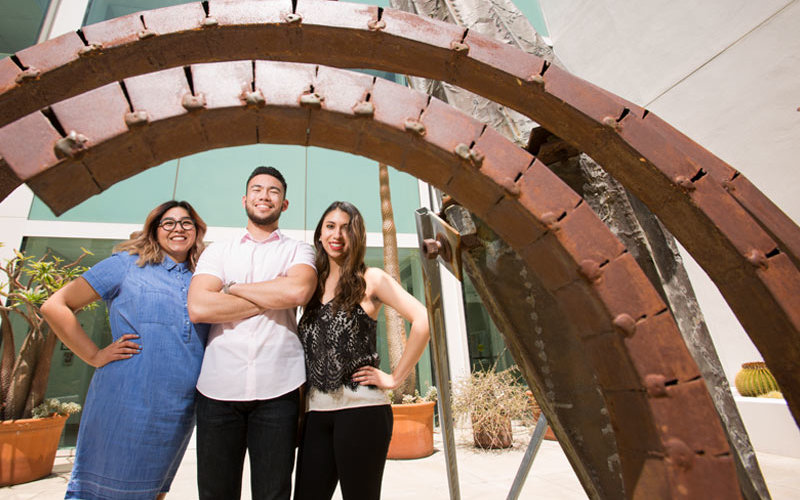
This summer, seven Maximizing Access to Research Careers (MARC) scholars will be trading their summer vacations for laboratories and research. It’s well worth it, they say, as it moves them closer to the reality of an advanced degree and a career in scientific exploration.
“This is a wonderful opportunity to go to a Ph.D. -granting institution, conduct research with the guidance of one of their instructors and be able to show I can do well at a top-tier institution,” says Erick Aguinaldo, a psychology major at Cal State Fullerton who will be traveling to the University of Michigan for eight weeks as part of the institution’s Summer Research Opportunity Program.
Aguinaldo will focus on the levels of testosterone in relationships, which will bring a biological perspective into his current research experience of studying sexual objectification and how it can affect academic performance. “This summer experience will help expand my research perspective because I haven’t looked at a biological aspect in my current study.
“Michigan is one of my top choices for graduate school and I’ll have the opportunity to meet some of the professors there, so that they can put my face to my application.”
Katia Niño, a biological science-molecular biology and biotechnology student, is also looking for the opportunity to get to know one of the institutions at the top of her graduate schools list. She will be involved in networking and professional development activities, as well as research, during UC San Diego’s eight-week Summer Training Academy for Research Success Program.
Fellow MARC Scholar and psychology major Vanessa Sanchez will travel to Cambridge, Massachusetts, to take part in the Broad Institute’s Summer Research Program. She will be studying neurobiology, the development of novel viral technologies to target and manipulate individual functional cell types across vertebrate species.
“I believe that this experience will strengthen my understanding of biological systems … develop my scientific mindset, enhance learning to collaborate with others — as well as teach me how to get others excited about my research — and how to translate my research to the world,” says Sanchez.
Also studying full time during the summer are:
- Christina Chavez, biological science-molecular biology and biotechnology, UCSF Summer Research Training Program
- Joshua Fonbuena, biological science-ecology and evolutionary biology, Summer Research Program Integrating Biology from Molecules to Ecosystems at UC Berkeley
- Sara Garcia, psychology, Summer Program for Undergraduate Research (SPUR) at the University of Oregon
- Allyson Weir, biological science-molecular biology and biotechnology, Plant Genome Research Program at the Boyce Thompson Institute
Aguinaldo, who hopes to complete a doctorate and become a researcher in neuroscience, joined the MARC program “because of its solid curriculum to help guide me in my academic career while also providing me with research experience.”
Sanchez agrees. “MARC can be demanding and hardcore, but it is so rewarding. The program has helped guide me toward redefining my research interests and has empowered me as a Hispanic woman pursuing a career in STEM, something I never considered before I transferred to Cal State Fullerton.”
“Being a part of MARC has reinforced the importance and my love of research,” said Nino. “I have definitely grown as a person and researcher. I have found my own voice.
“As the first in my family to go to college, it has been nice to have mentors who encouraged and guided me,” she added. “I honestly wouldn’t even have known how to apply to a summer research program or what it takes to apply to a Ph.D.- granting institution.”
Cal State Fullerton’s 22-year-old program pairs students with the university’s top research faculty, who provide guidance and support in conducting research, as well as workshops and seminars about how to compete and succeed in getting into competitive Ph.D. programs. Scholars receive stipends that help fund their scholarly activities, such as travel to professional conferences where they become comfortable presenting their research.